General, Sir John Monash, Personal Files Book 21, 3 October - 24 November 1918 - Part 15
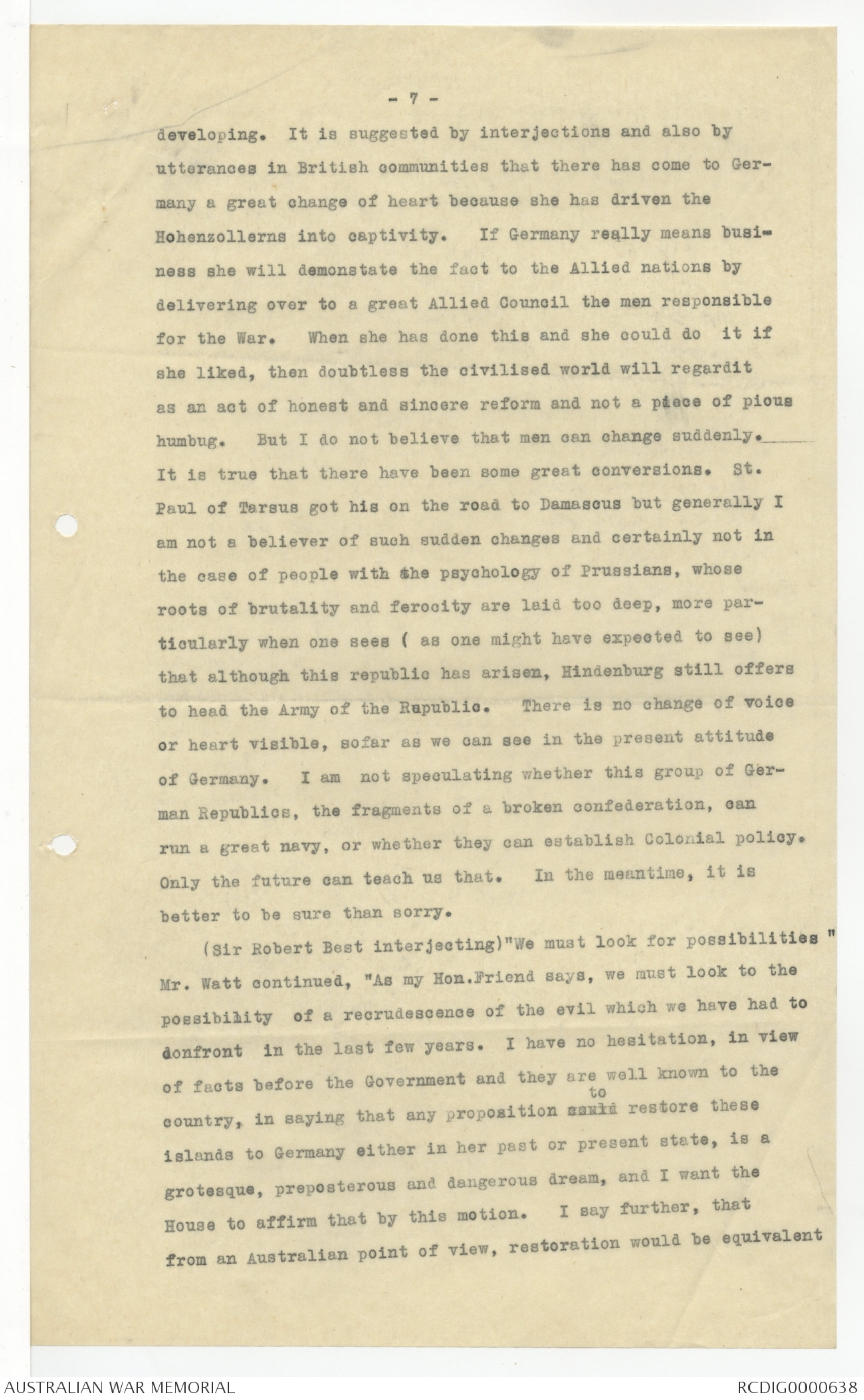
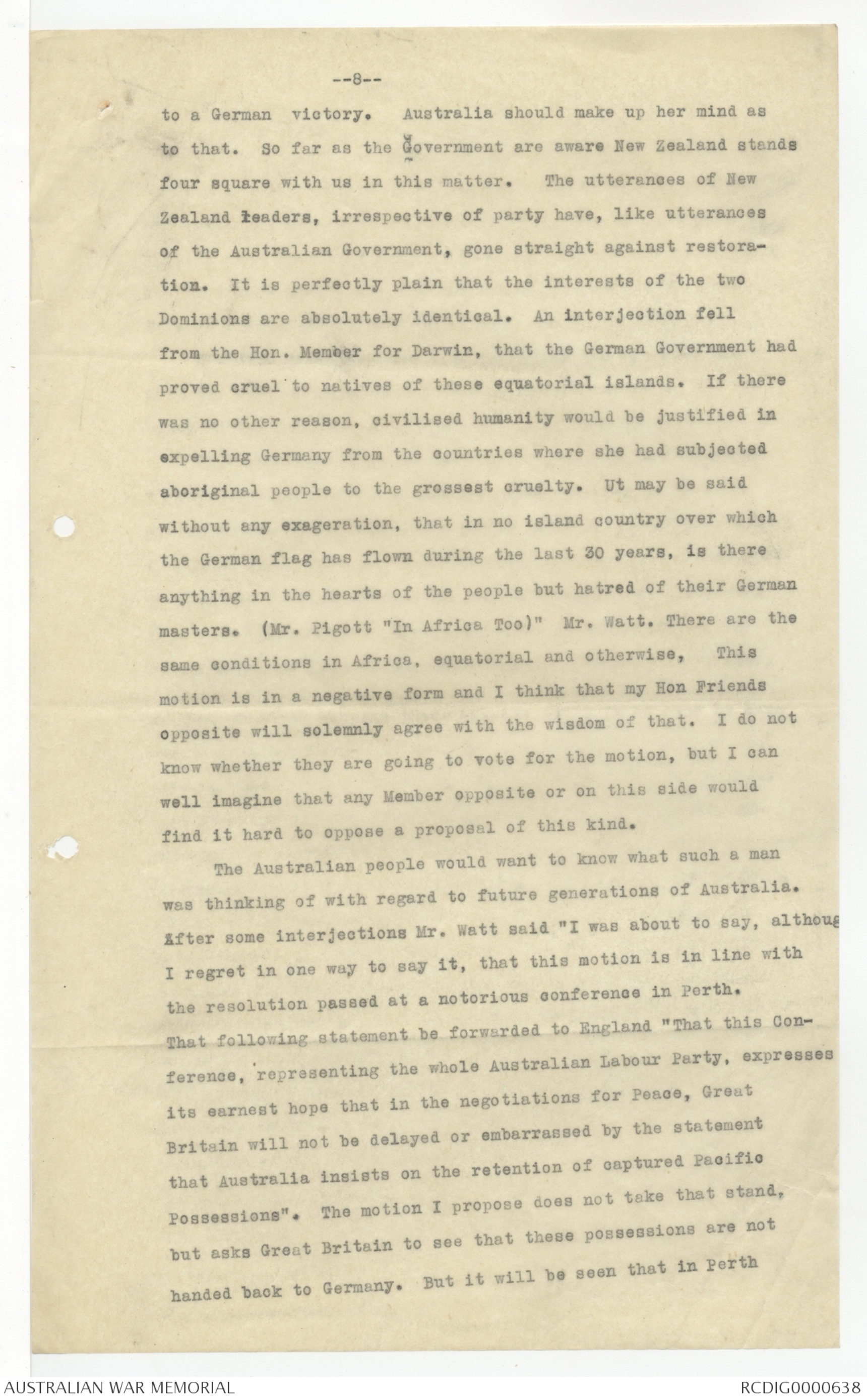
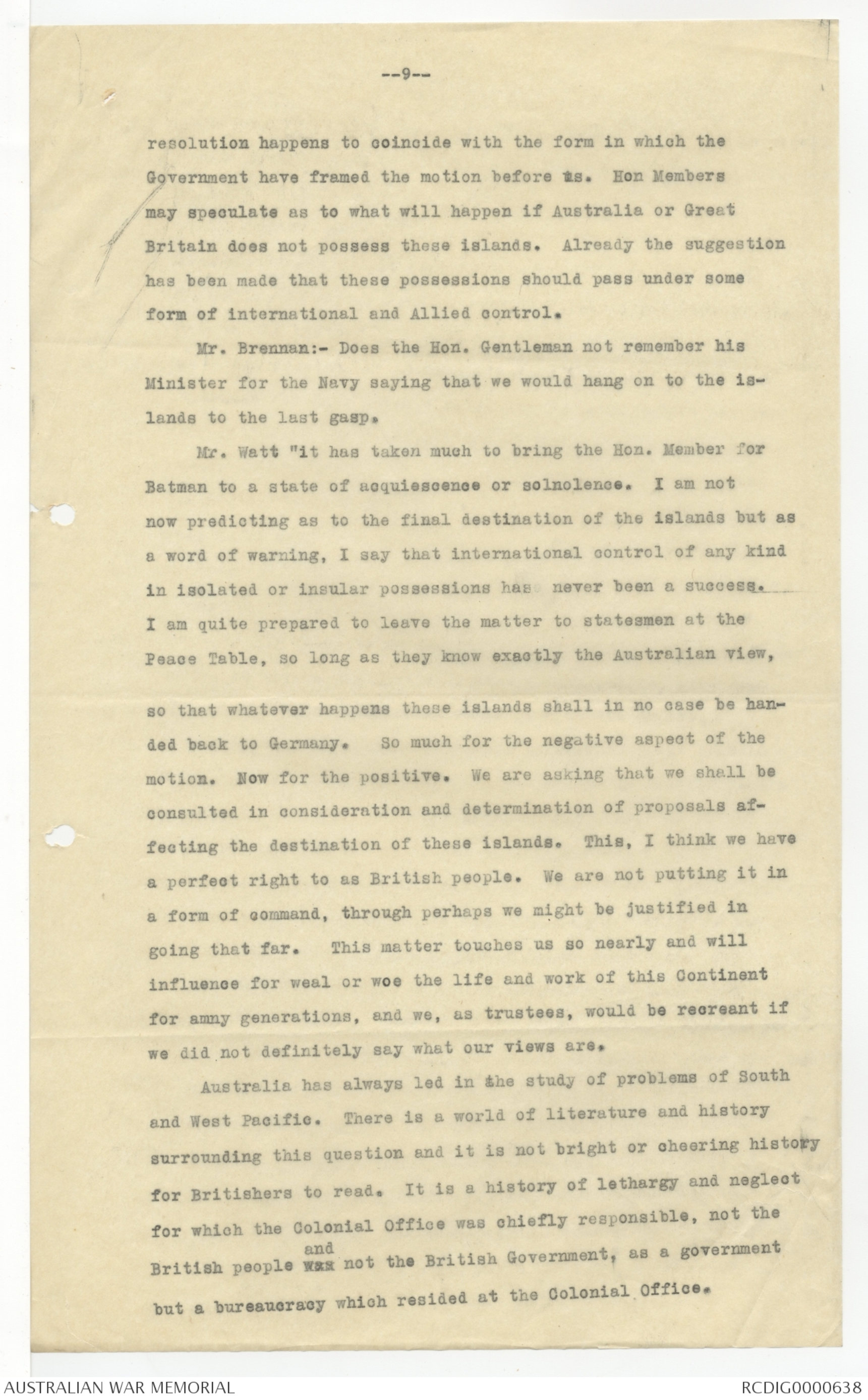
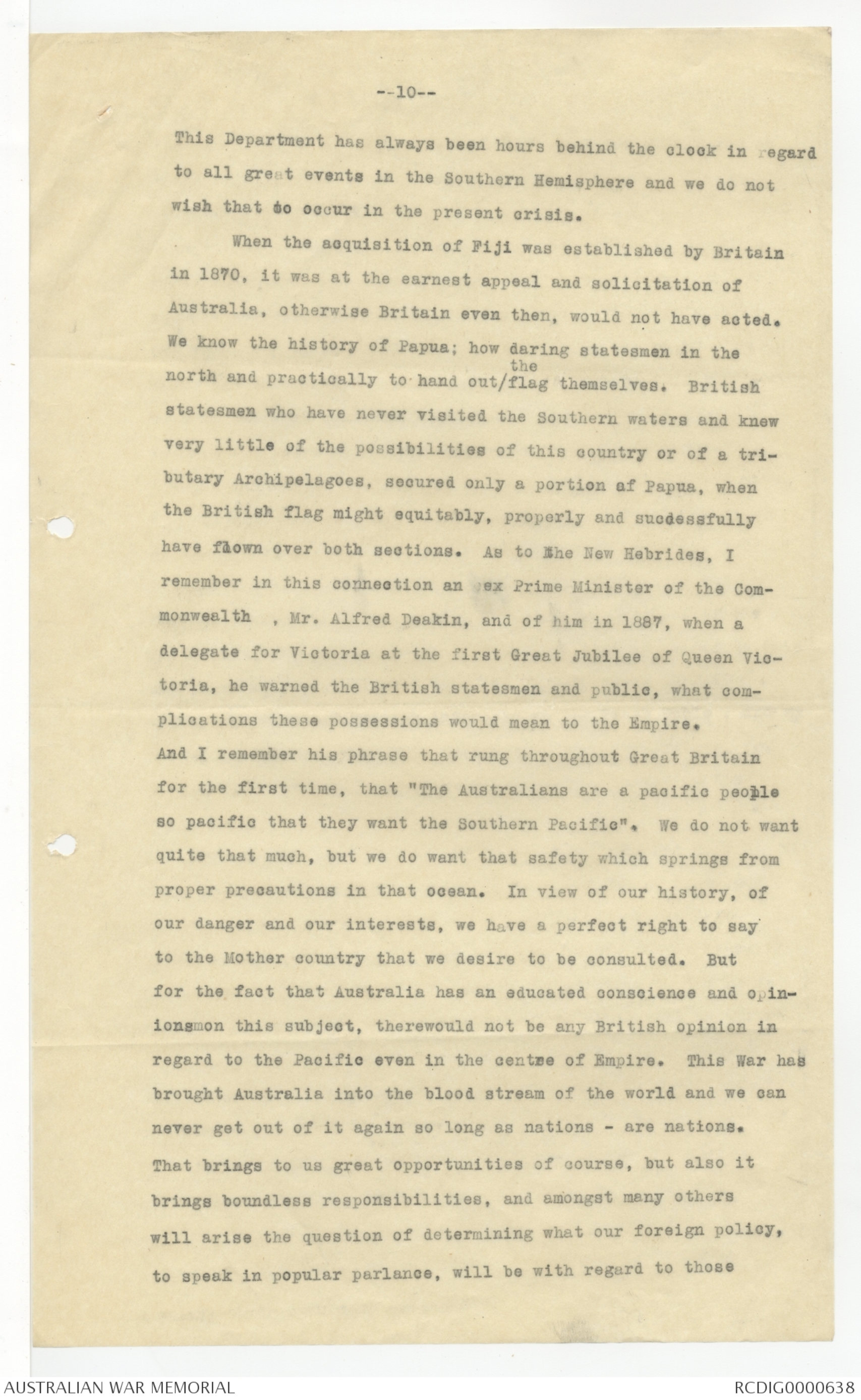
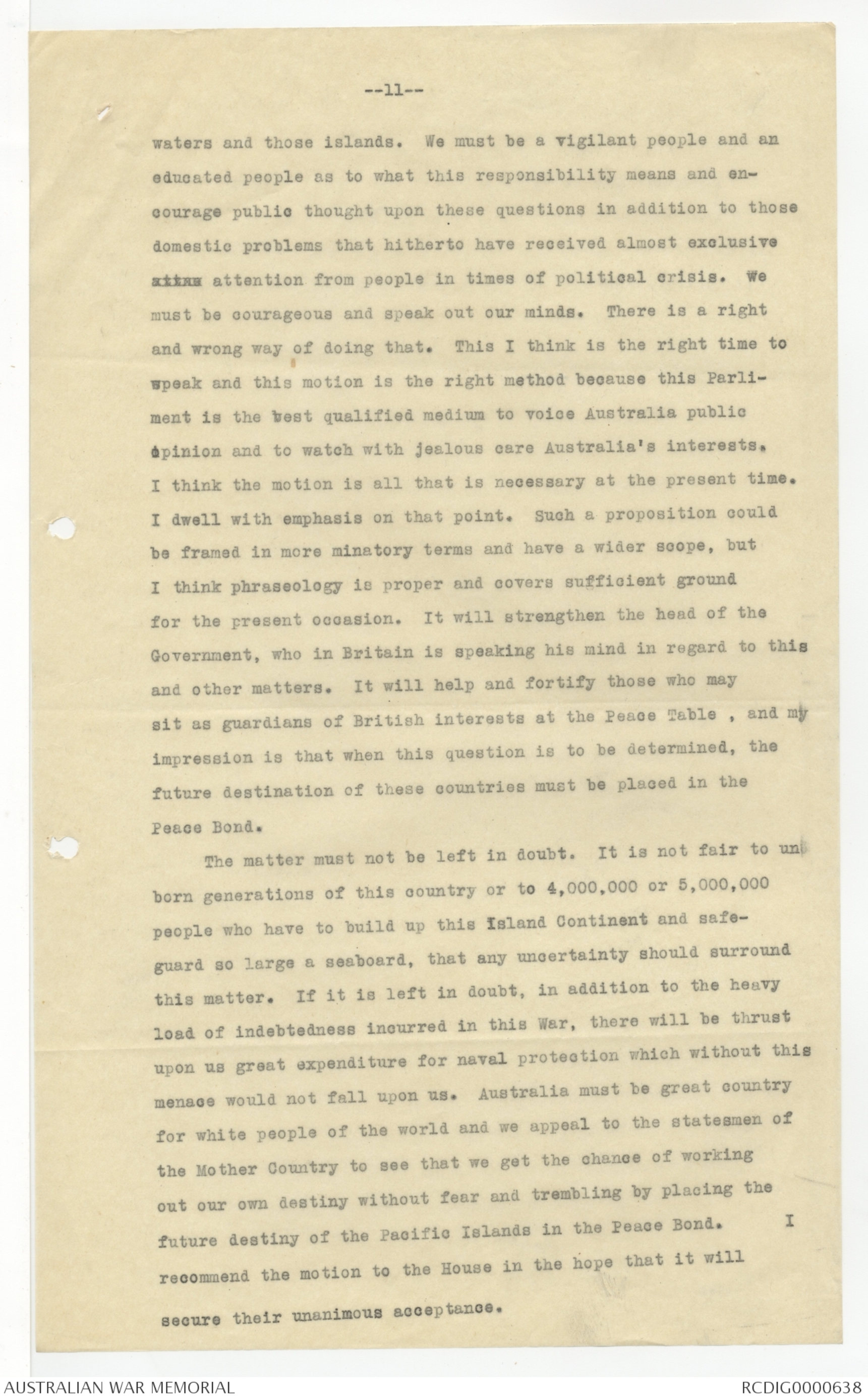
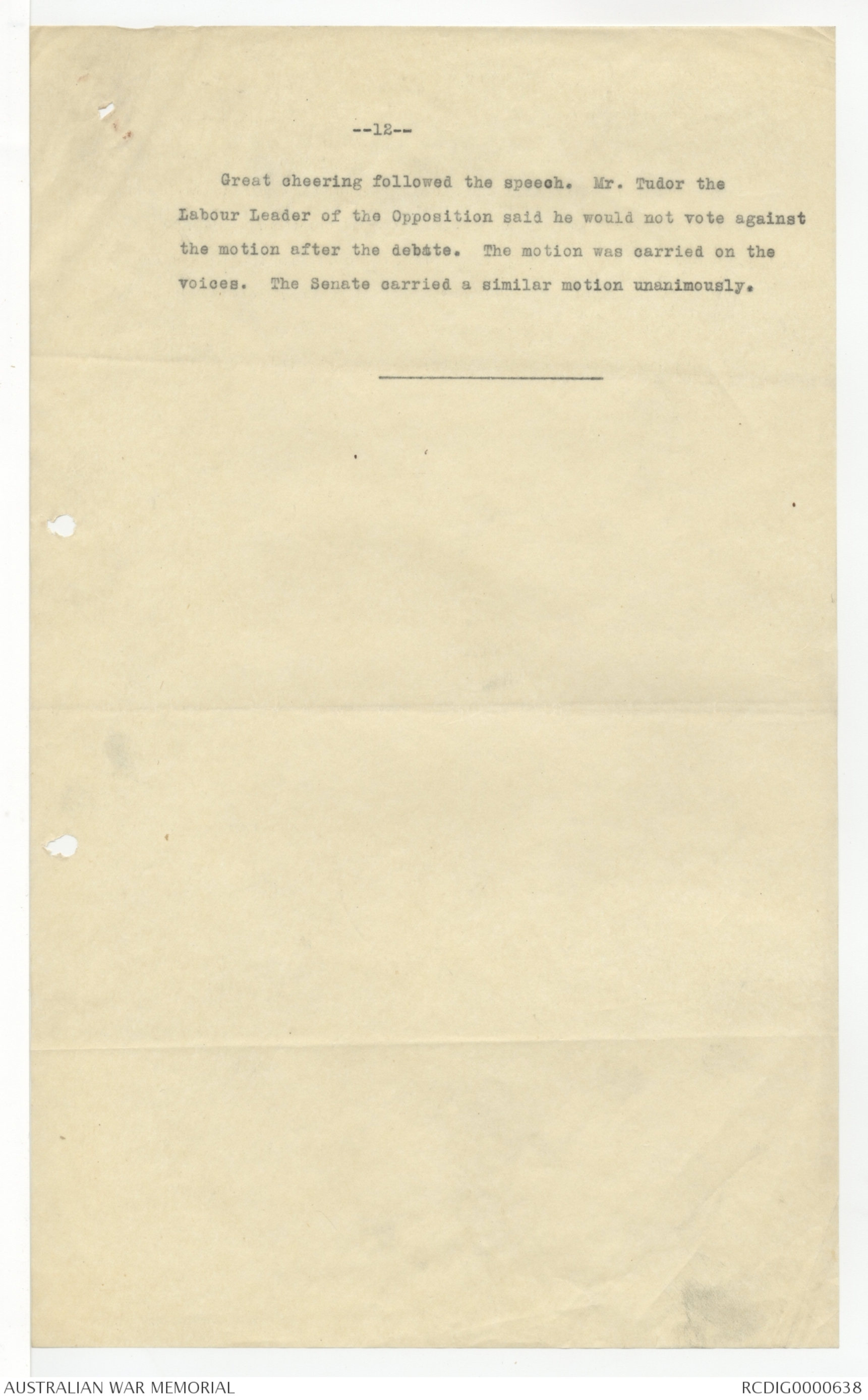
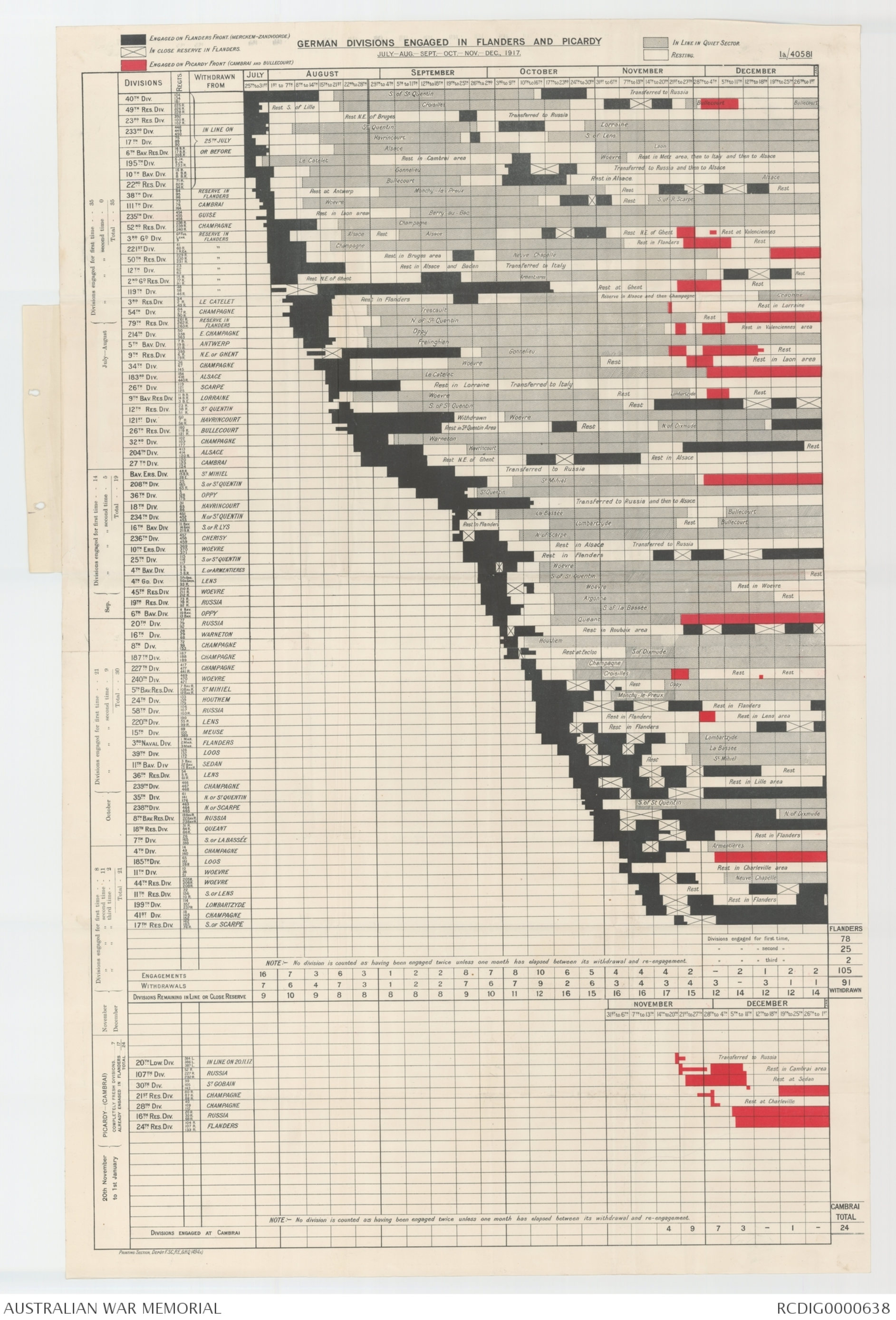
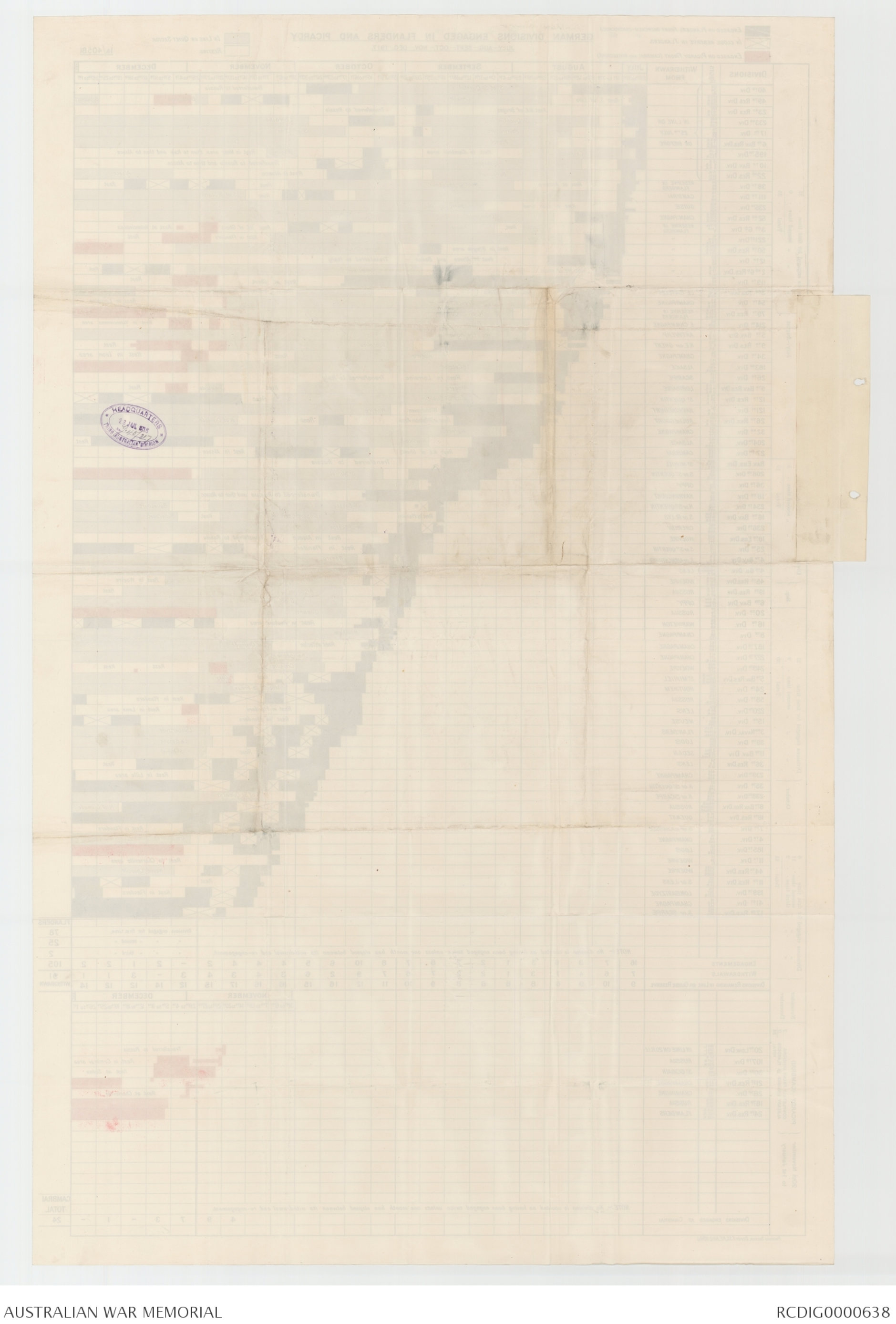
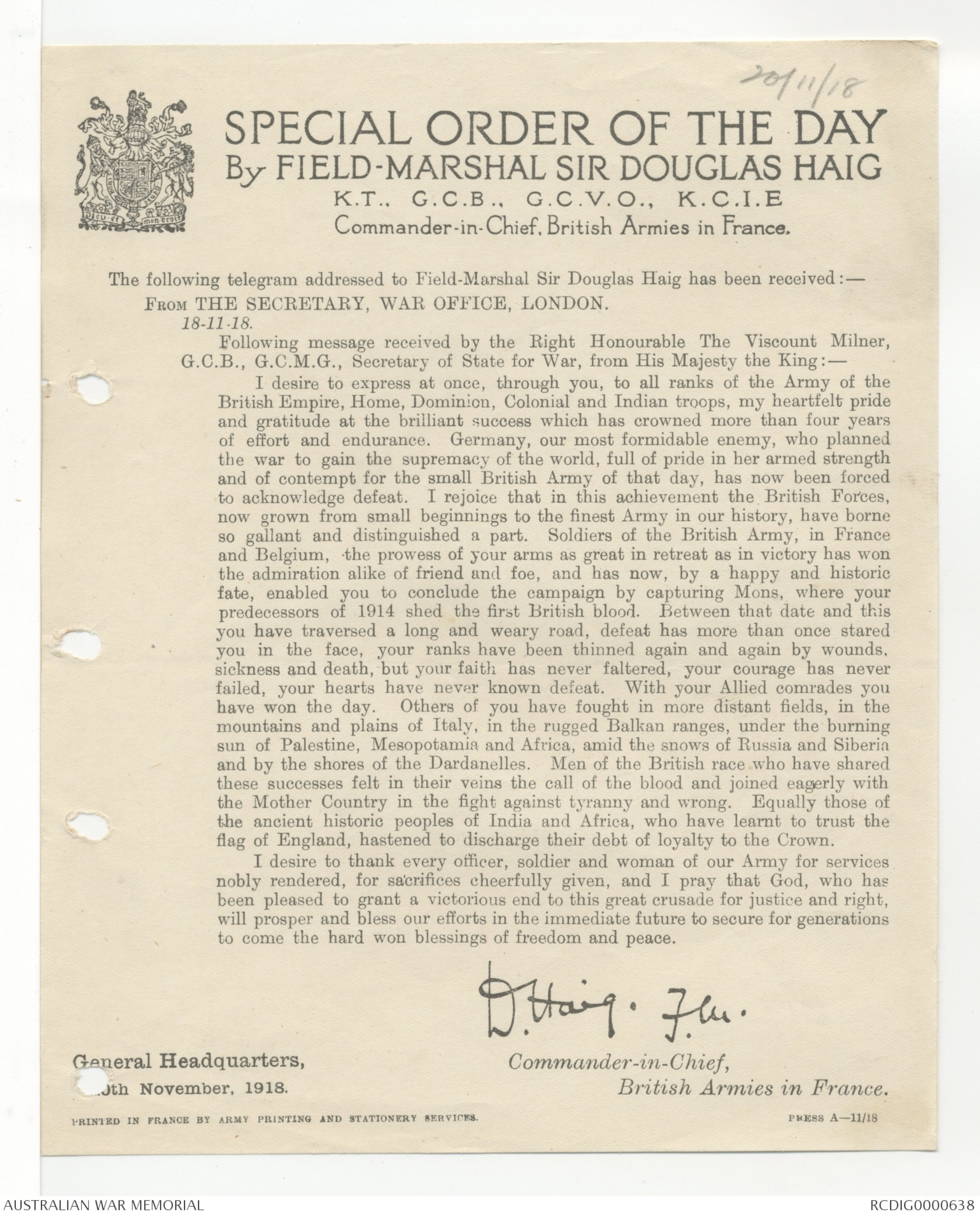
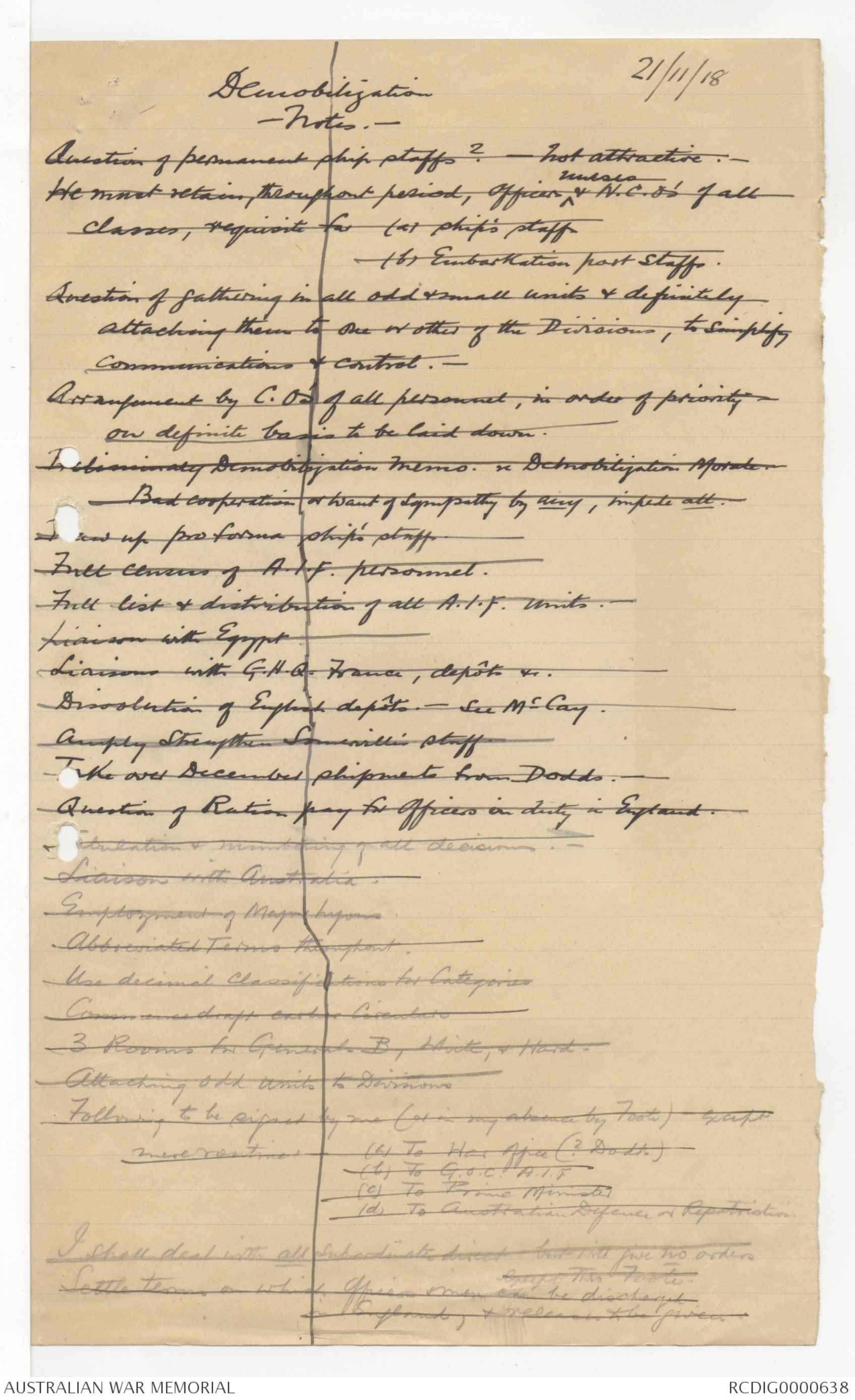
-7-
developing. It is suggested by interjections and also by
utterances in British communities that there has come to Germany
a great change of heart because she has driven the
Hohenzollerns into captivity. If Germany really means business
she will demonstrate the fact to the Allied nations by
delivering over to a great Allied Council the men responsible
for the War. When she has done this and she could do it if
she liked, then doubtless the civilised world will regard it
as an act of honest and sincere reform and not a piece of pious
humbug. But I do not believe that men can change suddenly.
It is true that there have been some great conversions. St.
Paul of Tarsus got his on the road to Damascus but generally I
am not a believer of such sudden changes and certainly not in
the case of people with the psychology of Prussians, whose
roots of brutality and ferocity are laid too deep, more particularly
when one sees (as one might have expected to see)
that although this republic has arisen, Hindenburg still offers
to head the Army of the Republic. There is no change of voice
or heart visible, sofar as we can see in the present attitude
of Germany. I am not speculating whether this group of German
Republics, the fragments of a broken confederation, can
run a great navy, or whether they can establish Colonial policy.
Only the future can teach us that. In the meantime, it is
better to be sure than sorry.
(Sir Robert Best interjecting) "We must look for possibilities"
Mr. Watt continued, "As my Hon. Friend says, we must look to the
possibility of a recrudescence of the evil which we have had to
confront in the last few years. I have no hesitation, in view
of facts before the Government and they are well known to the
country, in saying that any proposition could to restore these
islands to Germany either in her past or present state, is a
grotesque, preposterous and dangerous dream, and I want the
House to affirm that by this motion. I say further, that
from an Australian point of view, restoration would be equivalent
--8--
to a German victory. Australia should make up her mind as
to that. So far as the Government are aware New Zealand stands
four square with us in this matter. The utterances of New
Zealand leaders, irrespective of party have, like utterances
of the Australian Government, gone straight against restoration.
It is perfectly plain that the interests of the two
Dominions are absolutely identical. An interjection fell
from the Hon. Member for Darwin, that the German Government had
proved cruel to natives of these equatorial islands. If there
was no other reason, civilised humanity would be justified in
expelling Germany from the countries where she had subjected
aboriginal people to the grossest cruelty. It may be said
without any exageration, that in no island country over which
the German flag has flown during the last 30 years, is there
anything in the hearts of the people but hatred of their German
masters. (Mr. Pigott "In Africa Too)" Mr. Watt. There are the
same conditions in Africa, equatorial and otherwise, This
motion is in a negative form and I think that my Hon Friends
opposite will solemnly agree with the wisdom of that. I do not
know whether they are going to vote for the motion, but I can
well imagine that any Member opposite or on this side would
find it hard to oppose a proposal of this kind.
The Australian people would want to know what such a man
was thinking of with regard to future generations of Australia.
After some interjections Mr. Watt said "I was about to say, althoug
I regret in one way to say it, that this motion is in line with
the resolution passed at a notorious conference in Perth.
That following statement be forwarded to England "That this Conference,
representing the whole Australian Labour Party, expresses
its earnest hope that in the negotiations for Peace, Great
Britain will not be delayed or embarrassed by the statement
that Australia insists on the retention of captured Pacific
Possessions". The motion I propose does not take that stand,
but asks Great Britain to see that these possessions are not
handed back to Germany. But it will be seen that in Perth
--9--
resolution happens to coincide with the form in which the
Government have framed the motion before us. Hon Members
may speculate as to what will happen if Australia or Great
Britain does not possess these islands. Already the suggestion
has been made that these possessions should pass under some
form of international and Allied control.
Mr. Brennan:- Does the Hon. Gentleman not remember his
Minister for the Navy saying that we would hang on to the islands
to the last gasp.
Mr. Watt "it has taken much to bring the Hon. Member for
Batman to a state of acquiescence or solnolence. I am not
now predicting as to the final destination of the islands but as
a word of warning, I say that international control of any kind
in isolated or insular possessions has never been a success.
I am quite prepared to leave the matter to statesmen at the
Peace Table, so long as they know exactly the Australian view,
so that whatever happens these islands shall in no case be handed
back to Germany. So much for the negative aspect of the
motion. Now for the positive. We are asking that we shall be
consulted in consideration and determination of proposals affecting
the destination of these islands. This, I think we have
a perfect right to as British people. We are not putting it in
a form of command, through perhaps we might be justified in
going that far. This matter touches us so nearly and will
influence for weal or woe the life and work of this Continent
for amny generations, and we, as trustees, would be recreant if
we did not definitely say what our views are.
Australia has always led in the study of problems of South
and West Pacific. There is a world of literature and history
surrounding this question and it is not bright or cheering history
for Britishers to read. It is a history of lethargy and neglect
for which the Colonial Office was chiefly responsible, not the
British people was and not the British Government, as a government
but a bureaucracy which resided at the Colonial Office.
--10--
This Department has always been hours behind the clock in regard
to all great events in the Southern Hemisphere and we do not
wish that to occur in the present crisis.
When the acquisition of Fiji was established by Britain
in 1870, it was at the earnest appeal and solicitation of
Australia, otherwise Britain even then, would not have acted.
We know the history of Papua; how daring statesmen in the
north and practically to hand out/ the flag themselves. British
statesmen who have never visited the Southern waters and knew
very little of the possibilities of this country or of a tributary
Archipelagoes, secured only a portion of Papua, when
the British flag might equitably, properly and successfully
have flown over both sections. As to the New Hebrides, I
remember in this connection an ex Prime Minister of the Commonwealth,
Mr. Alfred Deakin, and of him in 1887, when a
delegate for Victoria at the first Great Jubilee of Queen Victoria,
he warned the British statesmen and public, what complications
these possessions would mean to the Empire.
And I remember his phrase that rung throughout Great Britain
for the first time, that "The Australians are a pacific people
so pacific that they want the Southern Pacific". We do not want
quite that much, but we do want that safety which springs from
proper precautions in that ocean. In view of our history, of
our danger and our interests, we have a perfect right to say
to the Mother country that we desire to be consulted. But
for the fact that Australia has an educated conscience and opinions
on this subject, there would not be any British opinion in
regard to the Pacific even in the centre of Empire. This War has
brought Australia into the blood stream of the world and we can
never get out of it again so long as nations - are nations.
That brings to us great opportunities of course, but also it
brings boundless responsibilities, and amongst many others
will arise the question of determining what our foreign policy,
to speak in popular parlance, will be with regard to those
--11--
waters and those islands. We must be a vigilant people and an
educated people as to what this responsibility means and encourage
public thought upon these questions in addition to those
domestic problems that hitherto have received almost exclusiveattn attention from people in times of political crisis. We
must be courageous and speak out our minds. There is a right
and wrong way of doing that. This I think is the right time to
speak and this motion is the right method because this Parliament
is the best qualified medium to voice Australis public
opinion and to watch with speak care Australia's interests.
I think the motion is all that is necessary at the present time.
I dwell with emphasis on that point. Such a proposition could
be framed in more minatory terms and have a wider scope, but
I think phraseology is proper and covers sufficient ground
for the present occasion. It will strengthen the head of the
Government, who in Britain is speaking his mind in regard to this
and other matters. It will help and fortify those who may
sit as guardians of British interests at the Peace Table, and my
impression is that when this question is to be determined, the
future destination of these countries must be placed in the
Peace Bond.
The matter must not be left in doubt. It is not fair to unborn
generations of this country or to 4,000,000 or 5,000,000
people who have to build up this Island Continent and safeguard
so large a seaboard, that any uncertainty should surround
this matter. If it is left in doubt, in addition to the heavy
load of indebtedness incurred in this War, there will be thrust
upon us great expenditure for naval protection which without this
menace would not fall upon us. Australia must be great country
for white people of the world and we appeal to the statesmen of
the Mother Country to see that we get the chance of working
out our own destiny without fear and trembling by placing the
future destiny of the Pacific Islands in the Peace Bond. I
recommend the motion to the House in the hope that it will
secure their unanimous acceptance.
--12--
Great cheering followed the speech. Mr. Tudor the
Labour Leader of the Opposition said he would not vote against
the motion after the debate. The motion was carried on the
voices. The Senate carried a similar motion unanimously.
Graph - German Divisions engaged in Flanders & Picardy
See original document
20/11/18
SPECIAL ORDER OF THE DAY
By FIELD-MARSHALL SIR DOUGLAS HAIG
K.T. G.C.B, G.C.V.O..K.C.I.E
Commander-in-Chief. British Armies in France.
The following telegram addressed to Field-Marshal Sir Douglas Haig has been received:-
FROM THE SECRETARY, WAR OFFICE, LONDON.
18-11.18.
Following message received by the Right Honourable The Viscount Milner,
G.C.B., G.C.M.G., Secretary of State for War, from His Majesty the King:-
I desire to express at once, through you, to all ranks of the Army of the
British Empire, Home, Dominion, Colonial and Indian troops, my heartfelt pride
and gratitude at the brilliant success which has crowned more than four years
of effort and endurance. Germany, our most formidable enemy, who planned
the war to gain the supremacy of the world, full of pride in her armed strength
and of contempt for the small British Army of that day, has now been forced
to acknowledge defeat. I rejoice that in this achievement the British Forces,
now grown from small beginnings to the finest Army in our history, have borne
so gallant and distinguished a part. Soldiers of the British Army, in France
and Belgium, the prowess of your arms as great in retreat as in victory has won
the admiration alike of friend and foe, and has now, by a happy and historic
fate, enabled you to conclude the campaign by capturing Mons, where your
predecessors of 1914 shed the first British blood. Between that date and this
you have traversed a long and weary road, defeat has more than once stared
you in the face, your ranks have been thinned again and again by wounds,
sickness and death, but your faith has never faltered, your courage has never
failed, your hearts have never known defeat. With your Allied comrades you
have won the day. Others of you have fought in more distant fields, in the
mountains and plains of Italy, in the rugged Balkan ranges, under the burning
sun of Palestine, Mesopotamia and Africa, amid the snows of Russia and Siberia
and by the shores of the Dardanelles. Men of the British race who have shared
these successes felt in their veins the call of the blood and joined eagerly with
the Mother Country in the fight against tyranny and wrong. Equally those of
the ancient historic peoples of India and Africa, who have learnt to trust the
flag of England, hastened to discharge their debt of loyalty to the Crown.
I desire to thank every officer, soldier and woman of our Army for services
nobly rendered, for sacrifices cheerfully given, and I pray that God, who has
been pleased to grant a victorious end to this great crusade for justice and right,
will prosper and bless our efforts in the immediate future to secure for generations
to come the hard won blessings of freedom and peace.
D.Haig. F.M.
Commander-in-Chief,
British Armies in France.
General Headquarters,
20th November, 1918.
Demobilization 21/11/18
-Notes .-Question of permanent ship staffs? Not attractive. -We must retain, throughout period, officers ^nurses & N.C.Os' of allclasses, requisite for (a) ship's staff(b) Embarkation past staffs.Question of gathering in all odd & small units & definitelyattaching them to one or other of the Divisions, to simplifycommunications & control. - Arrangement by C.O's of all personnel, in order of priority -on definite basis to be laid down.Preliminary Demobilization Memo. re Demobilization Morale. -Bad Cooperation or want of sympathy by any, impede all.Draw up pro forma ships' staff.Full census of A.I.F. personnel.Full list & distribution of all A.I.F. units. -Liaison with EgyptLiaisons with G.H.Q. France, depôts &cCirculation & numbering of all decisions. -Liaison with Australia.Employment of Major Lyons.Abbreviated terms throughout.Use decimal classification for Categories.Commence draft active Circulars3 Rooms for Genral B, White, & Hard-Attaching old units to DivisionsFollowing, to be signed by me (or in my absence by Foote) - exceptmere routines - (a) To War office (? Dodd)(b) To G.O.C. A.I.F.(c) To Prime Minister(d) To Australian Defence or RepatriationI shall deal with all subordinate direct but will give no ordersexcept to FooteSettle terms on which Officers & men can be dischargedin England, & releases to be given
 Sam scott
Sam scottThis transcription item is now locked to you for editing. To release the lock either Save your changes or Cancel.
This lock will be automatically released after 60 minutes of inactivity.